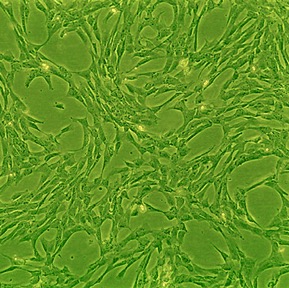Canine Chondrocytes: CnC
Description
Canine Chondrocytes (CnC) are derived from normal canine articular cartilage where they produce and maintain the extracellular matrix of cartilage. Following monolayer culturing, CnC can be grown in alginate microspheres to study chondrocyte proliferation and metabolism in a three-dimensional in vitro system. Alginate microspheres provide more physiological conditions for the chondrocytes and allow them to sustain normal proteoglycans production and retention. Because of the prevalence of degenerative joint disease in geriatric dogs, CnC can be a useful tool for veterinary practice.
Canine Chondrocytes (CnC) from Cell Applications, Inc. were utilized to evaluate anti-inflammatory and anti-oxidant activity of Glyco-Flex III and trans-pterostilbene. They were also used in material studies aimed to develop optimal surfaces/scaffolds for engineered tissues, cellular arrays, biosensors and lab-on-chip devices.
Details
| Tissue | Normal healthy canine articular cartilage | |
|---|---|---|
| QC | No bacteria, yeast, fungi, mycoplasma | |
| Bioassay | Attach, spread, proliferate in Growth Med | |
| Cryovial | 500,000 CnC (1st passage) frozen in Basal Medium w/ 10% FBS, 10% DMSO | |
| Kit | Cryovial frozen CnC (Cn402-05), Growth Medium (Cn411-500), Subcltr Rgnt Kit (090K) | |
| Proliferating | Shipped in Gr Med, 2nd psg (flasks or plates) | |
| Doublings | At least 10 | |
| Applications | Laboratory research use only (RUO). Not for human, clinical, diagnostic or veterinary use. |
Resources
FAQs
Need More Help?
Visit our comprehensive FAQ page for detailed answers to common questions.
Need More Help?
Visit our comprehensive FAQ page for detailed answers to common questions.
Primary Cell FAQs